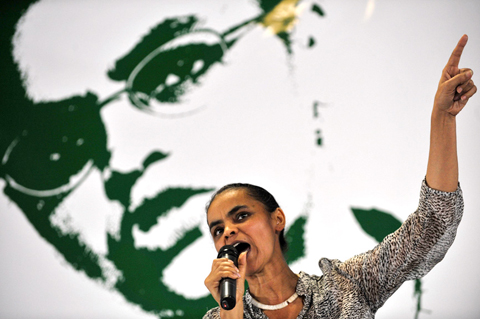Brazil’s former environment minister Marina Silva took another big step on Sunday toward an expected presidential bid by joining the Green Party, which wants to field her in next year’s race.
Silva, an internationally renowned defender of the Amazon, shook up Brazil’s political landscape last month when she said she may run for the country’s top job.
“I feel honored with the invitation to run for the presidency and that people embraced the idea,” Silva told party leaders and supporters in Sao Paulo.

PHOTO: AFP
“But we’ll take that decision only in 2010,” she said, amid chants of “Marina for President”.
Earlier this month, she abandoned Brazilian President Luiz Inacio Lula da Silva’s ruling Workers’ Party, or PT, which she had helped found 30 years ago.
The soft-spoken Silva suggested she didn’t want to burn bridges but find common ground around the environment issue.
“I’m leaving to build a new house, maybe on the same street,” she said, referring to her departure from the PT.
Her candidacy could divide the pro-government vote and undermine the election chances of Lula’s chosen successor, his chief of staff Dilma Rousseff.
Silva and Rousseff would both vie for left-wing and female voters, but most analysts believe the race is still likely to be dominated by Rousseff and Sao Paulo state Governor Jose Serra of the opposition PSDB party.
During her half hour speech on Sunday, Silva referred to her friend, the legendary conservationist Chico Mendes, and other figures from civil rights movements, such as Martin Luther King and Nelson Mandela.
Silva, 51, returned to her seat in the Senate when she resigned as environment minister in May last year citing opposition within the government to her environmental agenda.
Although she could siphon off votes from Rousseff, Silva’s lack of name recognition, access to television advertising or a strong track record means she will struggle to compete, analysts say.
Voters may also have concerns about her past health problems. The former rubber tapper who worked her way out of poverty as a maid has had hepatitis, malaria and metal poisoning. She was hospitalized on several occasions, even as environment minister.
Silva trailed a distant fifth with 3 percentage points in a survey by polling firm Datafolha released earlier this month, which showed Serra in the lead with 37 points and Rousseff in second place with 16.
The Green Party, long a fringe party in Brazil with little clout, made headlines last year when its candidate, Deputy Fernando Gabeira, nearly won the mayorship of Rio de Janeiro.

In the sweltering streets of Jakarta, buskers carry towering, hollow puppets and pass around a bucket for donations. Now, they fear becoming outlaws. City authorities said they would crack down on use of the sacred ondel-ondel puppets, which can stand as tall as a truck, and they are drafting legislation to remove what they view as a street nuisance. Performances featuring the puppets — originally used by Jakarta’s Betawi people to ward off evil spirits — would be allowed only at set events. The ban could leave many ondel-ondel buskers in Jakarta jobless. “I am confused and anxious. I fear getting raided or even

POLITICAL PATRIARCHS: Recent clashes between Thailand and Cambodia are driven by an escalating feud between rival political families, analysts say The dispute over Thailand and Cambodia’s contested border, which dates back more than a century to disagreements over colonial-era maps, has broken into conflict before. However, the most recent clashes, which erupted on Thursday, have been fueled by another factor: a bitter feud between two powerful political patriarchs. Cambodian Senate President and former prime minister Hun Sen, 72, and former Thai prime minister Thaksin Shinawatra, 76, were once such close friends that they reportedly called one another brothers. Hun Sen has, over the years, supported Thaksin’s family during their long-running power struggle with Thailand’s military. Thaksin and his sister Yingluck stayed

Kemal Ozdemir looked up at the bare peaks of Mount Cilo in Turkey’s Kurdish majority southeast. “There were glaciers 10 years ago,” he recalled under a cloudless sky. A mountain guide for 15 years, Ozdemir then turned toward the torrent carrying dozens of blocks of ice below a slope covered with grass and rocks — a sign of glacier loss being exacerbated by global warming. “You can see that there are quite a few pieces of glacier in the water right now ... the reason why the waterfalls flow lushly actually shows us how fast the ice is melting,” he said.

RESTRUCTURE: Myanmar’s military has ended emergency rule and announced plans for elections in December, but critics said the move aims to entrench junta control Myanmar’s military government announced on Thursday that it was ending the state of emergency declared after it seized power in 2021 and would restructure administrative bodies to prepare for the new election at the end of the year. However, the polls planned for an unspecified date in December face serious obstacles, including a civil war raging over most of the country and pledges by opponents of the military rule to derail the election because they believe it can be neither free nor fair. Under the restructuring, Myanmar’s junta chief Min Aung Hlaing is giving up two posts, but would stay at the